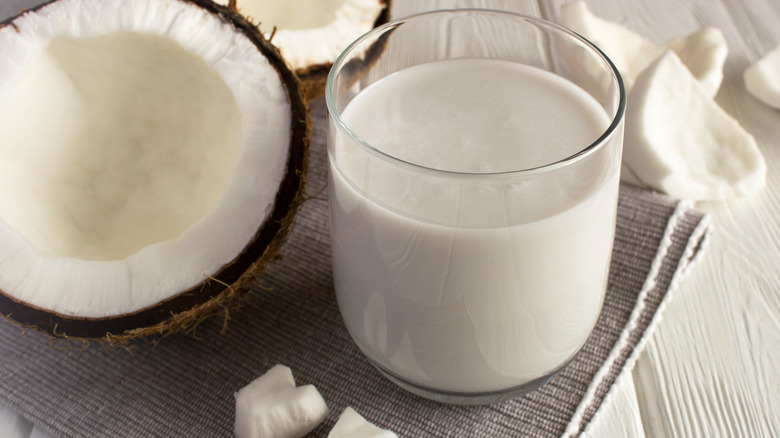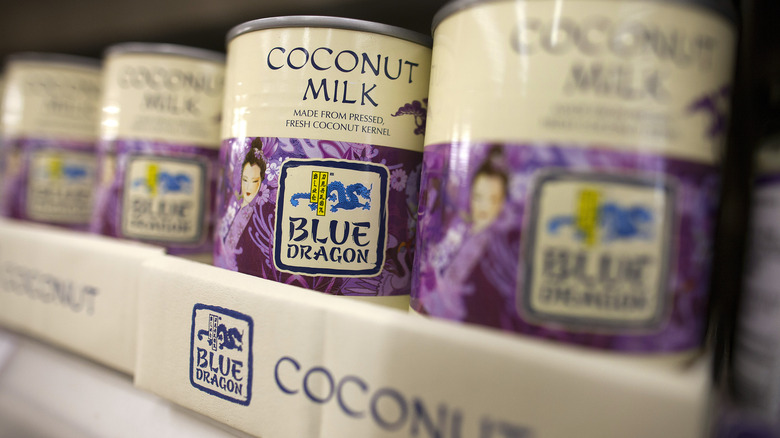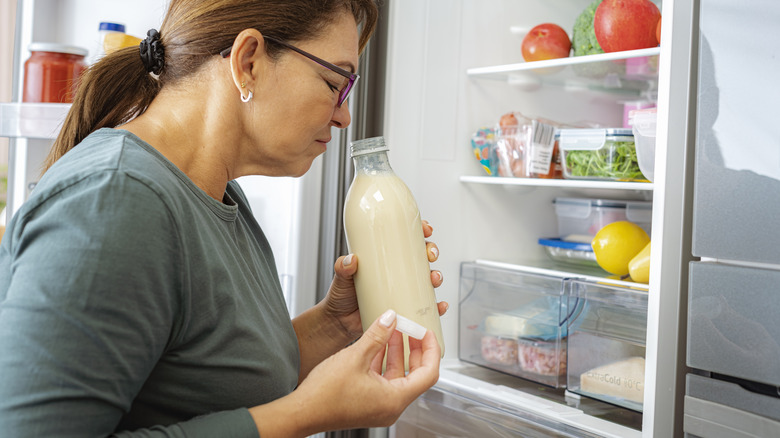Here's How To Know If Coconut Milk Has Gone Bad
Whether you enjoy plant-based milk for its taste, smaller environmental footprint, or for personal dietary reasons, there is a lot to love about the many options on the market today. Coconut milk, with its creamy texture and subtly sweet taste, is a useful, vegan ingredient in dishes from curries to mashed sweet potatoes to smoothies. This "milk" is not the liquid found inside fresh coconuts — that's coconut water. Coconut milk is made by blending coconut flesh with water, creating a thick, rich liquid.
Because it's made from a nutritious fruit, coconut milk packs a healthful punch. It has anti-inflammatory effects and is full of energizing fatty acids, plus vitamins like iron and magnesium. With all these good traits being said, one downside of coconut milk is that it can be difficult to tell when it's spoiled. As we said, it can have a long shelf life, but that depends on its production and storage. Whether it's packaged in a carton or a can, here's how long your coconut milk should stay good, and how to avoid using the spoiled stuff in your food and drinks.
How long is coconut milk good for?
Canned coconut milk is typically used for cooking in dishes like soups, curries, and braises, while the refrigerated variety can be ideal for adding to drinks, cereal, and other cold recipes. But before you crack open that can of coconut milk, know that you'll have a limited amount of time to use it up.
The shelf life of most canned or other shelf-stable coconut milks is two to five years, which is much longer than versions found in the refrigerated section of the store. However, you should refrigerate shelf-stable milk once it's been opened, and you have a week to use it all. Meanwhile, an opened carton of refrigerated coconut milk should stay good for up to ten days. The life of an unopened carton will depend on the product, so check the expiration date on the package. Most unopened cartons of coconut milk stay good for several months in the fridge.
If you want your refrigerated coconut milk to last longer, consider freezing it. Frozen coconut milk should last for up to six months, but it's best to use it sooner rather than later, or its rich taste and smooth texture will decline. However, you shouldn't solely rely on these time frames to decide whether or not you should use your coconut milk. Always examine the product before each use to see if it needs to be thrown out.
Signs that your coconut milk has spoiled
To know if your coconut milk has gone bad, smelling it is the first and best test. If the milk gives off a pungent or sour odor, instead of a neutral or slightly sweet smell, it's time for it to hit the bin. Another way to know if your coconut milk is bad is to see if it has curdled, which will turn it gritty or lumpy. Any sort of change in the smooth consistency of the liquid is a big red flag, and mold is a much more obvious sign of spoilage. While certain moldy foods can be salvaged, coconut milk and other liquids can't be saved once they develop unappetizing flecks, clumps, or spores.
Lastly, a change in color is also a sign of bad coconut milk. The milk is supposed to be white, and when it spoils, it will turn darker in color. If you've watched for all these signs, but still aren't sure if your milk is bad, it's always best to play it safe. As the saying goes: When in doubt, throw it out. Still, mistakes happen, and if you've accidentally taken a taste of bad coconut milk (or you just want further encouragement to never risk it), you should learn what could happen if you consume the spoiled stuff.
What happens if you drink expired coconut milk?
If you think you've ingested some bad coconut milk, you could wind up with common symptoms of foodborne illness, such as stomach pain and nausea. Other, more extreme symptoms such as vomiting and diarrhea could occur, too. You might also experience digestive inflammation, as the fat in coconut milk turns rancid when it goes bad. All of this is due to harmful bacteria that the spoiled milk grows over time, so be diligent when checking coconut milk before drinking it or adding it to your food.
If your coconut milk is stored in an opaque package, pour it into a bowl or glass to examine it before use. Never drink it right out of the container — not only could you take a gulp without knowing that it's spoiled, but germs from your mouth will migrate into the milk and spoil it a lot faster. This is true for all milks and other drinks, not just coconut milk. Hygienic practices save on money and food waste, not to mention they keep you from getting sick. For the sake of your health, and the integrity of your next recipe, always check to make sure your coconut milk is good before using it.



